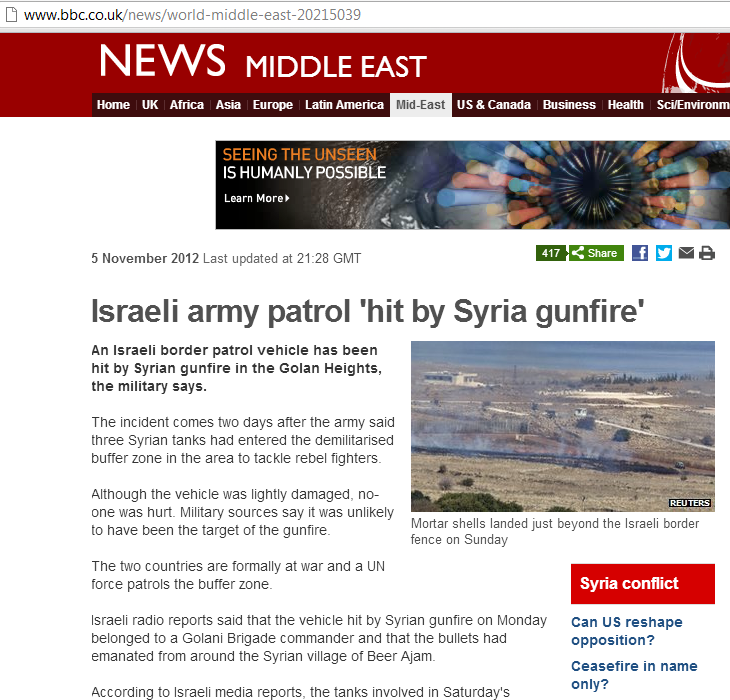The BBC has taken it upon itself to promote the theme of shortages in hospitals in the Gaza Strip – with little or no context.
Here are just a few examples:
An interview from November 18th with a WHO representative titled “Gaza medical supplies ‘running low’ – World Health Organisation” broadcast on BBC Television News.
A report by Ben Brown – also broadcast on BBC Television News on November 18th – in which he says:
“But there have been warnings from the World Health Organisation that the hospitals in Gaza are becoming overwhelmed and beginning to run out of supplies and really struggling to cope.”
From the same date – an entire report, headlined Gaza crisis: ‘Every hospital ward is full‘ by Wyre Davies, also broadcast on BBC Television News.
Davies says:
“We’ve been down to the main hospital in Gaza – Shifa Hospital – on many occasions. I was there a couple of days ago and every single ward was full and the emergency rooms were…every half hour or so they were bringing in the victims of Israeli air strikes ..erm.. and at the time they said they could cope but the problem of course is that the longer these attacks go on, the fewer supplies they have and of course if the attacks escalate into a full ground invasion there will be significantly more casualties. There have been 50, 52, Palestinian deaths in Gaza from the fighting over the last 4 or 5 days – half of these are civilians – but if there was to be a ground invasion, that will certainly increase.
Now..it..the …one significant development today in terms of aid and other materials getting in – the Kerem Shalom crossing between Israel and Gaza has been opened again this morning and that has allowed in …erm…several trucks containing aid and other basic equipment. So hopefully the hospitals and the aid agencies will be able to get their hands on some of that aid.”
Like his colleague Jon Donnison, Davies does not make it clear to audiences that the information he is repeating – both in terms of situations in hospitals and casualty numbers and causation – is coming from Hamas sources.
He also fails to mention the circumstances surrounding the closure of the Kerem Shalom crossing through which supplies enter the Gaza Strip. In reality, it is the very same Hamas which is providing information to Davies about shortages in hospitals which, together with its affiliates, is also firing rockets at the border crossing and repeatedly forcing its closure.
Another related point which Davies fails to address completely is the fact that Palestinian patients from Gaza continue throughout the hostilities to enter Israel through the Erez Crossing for medical treatment.
Here is the Kerem Shalom crossing on November 18th:
[youtube=http://www.youtube.com/watch?v=L7aCXbKmCnI&feature=youtube_gdata]
On November 19th, replacement parts for a CT scanner were transported into the Gaza Strip via Erez Crossing.
On November 19th, fourteen Palestinians and their accompaniers travelled into Israel for medical care.
On November 20th, 118 truck-loads of medical and other supplies were scheduled to enter the Gaza Strip via Kerem Shalom, but the crossing had to be closed due to rocket fire.
The problem of shortages in hospitals in the Gaza Strip did not, however begin with the current round of hostilities. The lack of communication and coordination between the Palestinian Authority in Gaza and Gaza’s Hamas rulers has for significant time been affecting both supplies to Gaza hospitals and the ability of patients to travel for medical treatment elsewhere.
Here is some relevant context:
The restricted medical supplies in Gaza are marked by a shortage of 400-500 varieties of medical equipment (out of a defined 700), including a shortage of surgical and anesthetic equipment.
There is an average shortage of 33% of desired types of drugs at any given time.
Medical suppliers are often reluctant to sell supplies to Gaza since there are issues with nonpayment.
All the requests for medical supplies (equipment and medicine) submitted by the international community to the Gaza CLA [The Coordination and Liaison Administration to Gaza] have been approved for entry into Gaza.
On average medical supply requests (medicines and light equipment) are approved within a span of 24-72 hours. Coordination of approved medical supplies is completed within one working day after the organization submits the intended day of import.
Since September 2012, international organizations, in coordination with the Gaza CLA, have imported 32 trucks of drugs and medical supplies through Kerem Shalom Crossing. This has included spare parts for dialysis machines, helium for MRI machines, and three fully ambulances. An additional five loads of medicine were imported into Gaza through the Erez Crossing through special coordination.
Since the beginning of Operation ‘Pillar of Cloud’:
Gaza hospitals are reported to be at 80% capacity, only slightly higher than intake then during routine periods.
On November 17th the Coordinator of Government Activities in the Territories updated Hassin el Alshich [Gaza Health Ministry] that, despite the problematic security situation and the ongoing rocket fire, it would be possible to transfer medical supplies into Gaza.
It is misleading – as well as inaccurate – when the BBC chooses to present to its viewers with a one-dimensional picture of the situation in Gaza hospitals as though all their problems were directly attributable to Israel’s actions when that is clearly not the case – either from the point of view of Hamas’ prevention of supplies arriving by rocket fire on the crossings or from the wider view of Hamas’ role in initiating the conflict.






